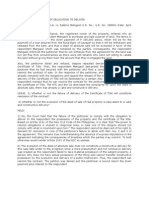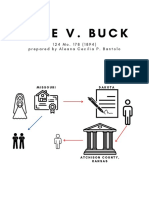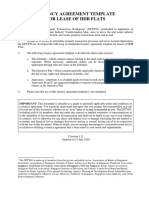Evid Rule 131 Presumption
Evid Rule 131 Presumption
Uploaded by
Aleana Cecilia BantoloCopyright:
Available Formats
Evid Rule 131 Presumption
Evid Rule 131 Presumption
Uploaded by
Aleana Cecilia BantoloCopyright
Available Formats
Share this document
Did you find this document useful?
Is this content inappropriate?
Copyright:
Available Formats
Evid Rule 131 Presumption
Evid Rule 131 Presumption
Uploaded by
Aleana Cecilia BantoloCopyright:
Available Formats
SPOUSES ARMANDO AND LORNA TRINIDAD C. IMSON G.R. NO.
197728, SEPTEMBER 16, 2015
Note: Rule 131, §2(b) presumption did not apply.
Background: Armando is the confidante of Marie Imson — Marie Imson was in the process of annulling
her marriage and because she did not want to disrupt the property arrangements agreed upon in the
annulment proceedings, she requested Armando to purchase the unit under his name from its three
Indian owners.
Initially, Marie Imson’s occupation of the unit was supported by a “Deed of Assignment and Transfer
of Rights” between Armando and the Indian owners. However, when Marie Imson left the country,
Armando sneakily executed a “Deed of Absolute Sale” with the Indian owners and thereafter sent a
demand letter, requesting that Marie Imson vacate the premises of the unit and pay rental arrears.
Armando filed a complaint for ejectment against Marie Imson.
Procedural Matters: The MeTC denied the petition and ruled that Marie Imson is the true owner
of the condominium unit on the basis of the bills of payment of association dues, utility bills,
real estate tax on the common areas and building insurance presented by respondent.
On appeal, however, the RTC reversed, ordered Marie Imson to pay rental arrearages, and held
that the Deed of Assignment and Transfer of Right and Deed of Absolute Sale in the name of
Armando is superior to the evidence presented by Marie Imson.
In a petition for review, the CA reversed the RTC and ruled that records of payment of the
purchase price of the subject property, through Marie Imson’s personal checks, acknowledgment
of these payments by the former owners by way of receipt and affidavit, and Marie Imson’s
exercise of acts of ownership prove that she is the owner of the disputed condominium unit and,
thus, is entitled to the possession thereof. The MR was denied. Hence, this petition for review
on certiorari.
Issue: Whether Marie Imson is barred from denying her supposed obligation to pay rent under her
original lease. No.
Ruling: It is clear from Section 2(b), Rule 131 of the Rules of Court that what a tenant is estopped from
denying is the title of his landlord at the time of the commencement of the landlord-tenant relation. If
the title asserted is one that is alleged to have been acquired subsequent to the
commencement of that relation, the presumption will not apply. Hence, the tenant may show
that the landlord’s title has expired or been conveyed to another or himself; and he is not estopped to
deny a claim for rent, if he has been ousted or evicted by title paramount.
In the present case, what Marie Imson is claiming is her title to the subject property which she acquired
subsequent to the commencement of the landlord-tenant relation between her and the former owners
of the questioned condominium unit. Thus, the presumption under Section 2(b), Rule 131 of the Rules
of Court does not apply and Marie Imson is not estopped from asserting title over the disputed property.
The Court is neither convinced by Armando’s argument that when they bought the subject property
from its former owners, they stepped into the shoes of the latter who were the lessors of respondent
Yong Digest | JDR Evid 2022 yonh
and that, as lessee, Marie Imson is barred from contesting the title of her lessor or her lessor’s
successor-in-interest, who are herein petitioners.
SPOUSES LOREN V. RIGOR G.R. NO. 221970 (NOTICE) NOVEMBER 21, 2018
Note: Rule 131, §2(b) presumption applied.
Rigor & Cabalona are the children of Eligio. Spouses Navarra were lessees in a Contract of Rentals with
Eligio. On the other hand, Spouses Loren occupied a portion of the same lot by mere tolerance, as
evinced by a Kasulatan sa Kasabutan.
Rigor & Cabalona demanded that Spouses Navarra & Spouses Loren vacate the land for failure to pay
rentals and their desire to use the lot. Thereafter, they filed an action for unlawful detainer, collection
of unpaid rentals, and damages against Spouses Navarra & Spouses Loren.
For an unlawful detainer case to prosper, the petitioner must prove two elements: (1) the fact of the
lease/tenancy and (2) the expiration of its terms. Spouses Navarra denies the tenancy relationship
because of a 1985 Misamis Oriental IAC Decision which held that the land was owned by a certain
Warlina, and not Eligio.
Issue: Whether the Spouses Navarra are estopped from denying their tenancy. Yes.
Ruling: The Rules of Court protects the lessor/landlord from being questioned by the lessee/tenant
regarding his or her title or better right of possession over the subject premises. The conclusive
presumption found in Section 2 (b), Rule 131 of the Rules of Court, known as estoppel against tenants.
In Samelo v. Manotok Services, Inc., we ruled that once a lessor- lessee or tenant-landlord relationship
is shown to exist between the parties, the lessee/tenant cannot by any proof, however strong, overturn
said conclusive presumption.
To be sure, we are not unaware of the jurisprudential principle that the rule on estoppel does not apply
if there was a change in the nature of the title of the lessor/landlord during the subsistence of the
lease/tenancy. For this exception to apply, the lessee/tenant must show that the subject property
covered by the lessor/landlord's title has expired, conveyed to another, or has been defeated by a title.
Admittedly, the 1985 Decision invoked by the petitioners is yet to be enforced. Verily, while petitioners
lessees/tenants are allowed by jurisprudence to assert ownership of the property by a third person not
a party to the ejectment case, they cannot legally assert enforcement of a 19-year-old unenforced
Decision in this separate and distinct summary proceeding.
Accordingly, the SC ruled that Rigor & Cabalona has a better right of possession over the subject
premises and ordered Spouses Navarra & Spouses Loren to vacate the property and pay accrued rentals
with interest.
Yong Digest | JDR Evid 2022 yonh
SPOUSES LOQUELLANO V. HSBC G.R. NO. 200553, DECEMBER 10, 2018
Note: Rule 131, §2(a) presumption applied.
In 1988, Rosalina Loquellano obtained a housing loan from her employer, HSBC. Unfortunately,
Rosalina Loquellano was dismissed from service for abandonment because of her participation in an
illegal strike between the bank and its union. Due to her termination, she was unable to pay her loan
obligations, beginning January 1994. HSBC sent several demand letters. HSBC also rejected Rosalina
Loquellano’s offer to make partial payments.
In 1995, Rosalina Loquellano was finally able to pay all her monthly installment arrears, interests, and
penalties. HSBC accepted the payments and credited them to her housing loan account. Thereafter,
Rosalina Loquellano received a demand letter requesting payment for her entire housing loan
obligation and two Installment Due Reminders showing a reduction in her outstanding balance.
Nonetheless, HSBC extrajudicially foreclosed the mortgaged property where it was sold to Manuel
Estacion. Thus, the Spouses Loquellano filed a complaint for annulment of sale with damages and
preliminary injunction against HSBC.
Procedural Matters: RTC ruled in favor of Spouses Loquellano. It ruled that HSBC was estopped
from disclaiming the payments made by Spouses Loquellano.
On appeal, the CA reversed and dismissed the complaint. It ruled that HSBC was not estopped
because although partial payment had been credited and applied to the principal loan, a
reservation for the complete satisfaction of the outstanding obligations was made known to the
Spouses Loquellano. Hence, this petition for review on certiorari.
Issue: Whether HSBC is estopped from disclaiming the payments made by Spouses Loquellano. Yes.
Ruling: To stress, HSBC-SRP continuously sent out monthly Installment Due Reminders to petitioner
Rosalina despite its demand letter dated September 25, 1995 to pay the full amount of the loan
obligation within 3 days from receipt of the letter. It, likewise, continuously accepted petitioner
Rosalina’s subsequent monthly amortization payments until June 1996; thus, making their default
immaterial. Moreover, there was no more demand for the payment of the full obligation afterwards.
Consequently, Spouses Loquellano were made to believe that respondent HSBC-SRP was applying their
payments to their monthly loan obligations as it had done before. It is now estopped from enforcing
its right to foreclose by reason of its acceptance of the delayed payments.
Also, Article 1235 of the Civil Code provides that when the creditor accepts performance, knowing its
incompleteness and irregularity without protest or objection, the obligation is deemed complied with.
Respondent HSBC-SRP accepted Rosalina’s payment of her housing loan account for almost one year
without any objection.
It is HSBC-SRP, not petitioner Rosalina, which has access and control of the computer system with
regard to the crediting of the housing loan payments. It cannot now deny its action of continuously
accepting petitioner Rosalina’s monthly amortizations, coupled with the sending out of installment due
reminders, and statements of her updated housing loan account to prejudice the Spouses Loquellano
who relied thereon.
Yong Digest | JDR Evid 2022 yonh
CONCEPCION V. COURT OF APPEALS G.R. NO. 123450. AUGUST 31, 2005
Note: Presumption of Legitimacy
In 1989, Gerardo Concepcion married Theresa Almonte. In 1991, the RTC annulled their marriage on
the ground of bigamy due to Theresa Almonte‘s previous marriage with Mario Gopiao in 1980.
Additionally, the RTC declared Jose Gerardo A. Concepcion an illegitimate child.
Initially, the CA sustained the RTC’s ruling. However, it reversed itself in the MR and held that Jose is
the legitimate child of Theresa Almonte and Mario Gopiao. The MR was denied. Hence, this appeal.
Issue: Whether Jose Gerardo is the illegitimate child of Gerardo Concepcion and Theresa Almonte. No.
Ruling: The law requires that every reasonable presumption be made in favor of legitimacy.
FC, Article 167. The child shall be considered legitimate although the mother may have declared
against its legitimacy or may have been sentenced as an adulteress.
FC, Article 54. A child who was conceived or born before the judgment of annulment or of
absolute nullity of the marriage on the ground of psychological incapacity has become final and
executory shall be considered legitimate.
The presumption of legitimacy does not only flow out of a declaration in the statute but is based on
the broad principles of natural justice and the supposed virtue of the mother. It is grounded on the
policy to protect the innocent offspring from the odium of illegitimacy
The presumption of legitimacy proceeds from the sexual union in marriage, particularly during the
period of conception. To overthrow this presumption on the basis of Article 166 (1)(b) of the
Family Code, it must be shown beyond reasonable doubt that there was no access that could have
enabled the husband to father the child. Sexual intercourse is to be presumed where personal access
is not disproved, unless such presumption is rebutted by evidence to the contrary.
The presumption is quasi-conclusive and may be refuted only by the evidence of physical impossibility
of coitus between husband and wife within the first 120 days of the 300 days which
immediately preceded the birth of the child.
To rebut the presumption, the separation between the spouses must be such as to make marital
intimacy impossible. This may take place, for instance, when they reside in different countries or
provinces and they were never together during the period of conception. Or, the husband was in prison
during the period of conception, unless it appears that sexual union took place through the violation of
prison regulations.
Here, during the period that Gerardo and Ma. Theresa were living together in Fairview, Quezon City,
Mario was living in Loyola Heights which is also in Quezon City. Fairview and Loyola Heights are only a
scant four kilometers apart. Not only did both Ma. Theresa and Mario reside in the same city but also
that no evidence at all was presented to disprove personal access between them. Considering these
Yong Digest | JDR Evid 2022 yonh
circumstances, the separation between Ma. Theresa and her lawful husband, Mario, was certainly not
such as to make it physically impossible for them to engage in the marital act.
Sexual union between spouses is assumed. Evidence sufficient to defeat the assumption should be
presented by him who asserts the contrary. There is no such evidence here. Thus, the presumption of
legitimacy in favor of Jose Gerardo, as the issue of the marriage between Ma. Theresa and Mario,
stands.
The reliance of Gerardo on Jose Gerardo’s birth certificate is misplaced. It has no evidentiary value in
this case because it was not offered in evidence before the trial court. The rule is that the court shall
not consider any evidence which has not been formally offered.
In addition, a record of birth is merely prima facie evidence of the facts contained therein. As prima
facie evidence, the statements in the record of birth may be rebutted by more preponderant evidence.
It is not conclusive evidence with respect to the truthfulness of the statements made therein by the
interested 47 parties. Between the certificate of birth which is prima facie evidence of Jose Gerardo’s
illegitimacy and the quasi-conclusive presumption of law (rebuttable only by proof beyond reasonable
doubt) of his legitimacy, the latter shall prevail. Not only does it bear more weight, it is also more
conducive to the best interests of the child and in consonance with the purpose of the law.
Yong Digest | JDR Evid 2022 yonh
You might also like
- 07.IAM SSG - Reliability - Engineering - v1.1 - 16Document76 pages07.IAM SSG - Reliability - Engineering - v1.1 - 16Abshalom Gultom100% (4)
- Ecc Standard Employment ContractDocument5 pagesEcc Standard Employment ContractRajeevRanjan100% (2)
- Certificate of AnalysisDocument3 pagesCertificate of AnalysisbrayanNo ratings yet
- Notarial Deed of Donation and TrustDocument9 pagesNotarial Deed of Donation and TrustMakanaka SambureniNo ratings yet
- CT Digests - October 7Document17 pagesCT Digests - October 7Rem SerranoNo ratings yet
- SSS vs. MoonwalkDocument4 pagesSSS vs. MoonwalkjlumbresNo ratings yet
- Reviewer - Cases On PledgeDocument9 pagesReviewer - Cases On PledgeGuiller C. MagsumbolNo ratings yet
- Some Credit CaseDocument6 pagesSome Credit CaseNadine Tubalinal SandinoNo ratings yet
- Obli Finals Quiz 1Document13 pagesObli Finals Quiz 1KingNo ratings yet
- Oblicon Batch 1 CasesDocument21 pagesOblicon Batch 1 CasesDonna Jane SimeonNo ratings yet
- Case Digests Obli Con First SetDocument5 pagesCase Digests Obli Con First SetMa Zola EstelaNo ratings yet
- Sales Case DigestsDocument4 pagesSales Case DigestschristimyvNo ratings yet
- Oblicon Digested CasesDocument5 pagesOblicon Digested CasesKaren Cate Ilagan PintoNo ratings yet
- Credit Case DigestDocument10 pagesCredit Case DigestBianca de GuzmanNo ratings yet
- Oblicon Digested Cases PDF FreeDocument5 pagesOblicon Digested Cases PDF FreeZafra ChunNo ratings yet
- Declaratory Relief - DigestsDocument7 pagesDeclaratory Relief - DigestsTheHoneybhieNo ratings yet
- Case Digest Civil Law Re. LastDocument4 pagesCase Digest Civil Law Re. LastSheila G. DolipasNo ratings yet
- pp193723 GMC vs. RamosDocument3 pagespp193723 GMC vs. RamosRowena Imperial Ramos100% (1)
- Tomimbang V 2Document10 pagesTomimbang V 2denelizaNo ratings yet
- Case Summary Majoy FinalDocument12 pagesCase Summary Majoy FinalMaricrisNo ratings yet
- Case Digests (Rule 62)Document13 pagesCase Digests (Rule 62)Nika GarciaNo ratings yet
- Velarde Et Al v. Court of Appeals - DigestDocument3 pagesVelarde Et Al v. Court of Appeals - DigestBeatriz Villafuerte0% (1)
- Cruz v. Sps Maximo and ChristensenDocument2 pagesCruz v. Sps Maximo and ChristensenBryan Jay NuiqueNo ratings yet
- Villamar Vs MangaoilDocument1 pageVillamar Vs MangaoilF Anton NicolasNo ratings yet
- Philippine National Bank v. Reyes Jr.Document9 pagesPhilippine National Bank v. Reyes Jr.Christian EdwardNo ratings yet
- Case Digest MidtermsDocument4 pagesCase Digest MidtermsJIREH MAE NOTARTENo ratings yet
- SCA - Case Digests (62-63)Document12 pagesSCA - Case Digests (62-63)MJ ApolinarNo ratings yet
- PNB V Sps MaranonDocument2 pagesPNB V Sps MaranonNonai PinedaNo ratings yet
- Credit Transactions - Digest Compilation I - PartialDocument14 pagesCredit Transactions - Digest Compilation I - PartialMilesNo ratings yet
- Assignment in CreditDocument55 pagesAssignment in CreditNyanNo ratings yet
- Tamio vs. TicsonDocument5 pagesTamio vs. TicsonMichiko HakuraNo ratings yet
- Case Digest: Alolina vs. Flores G.R. No. 198774 I April 04, 2016Document4 pagesCase Digest: Alolina vs. Flores G.R. No. 198774 I April 04, 2016Danny FentomNo ratings yet
- DIGESTS of MACEDA LAW CASESDocument6 pagesDIGESTS of MACEDA LAW CASESVee VirayNo ratings yet
- PNB Vs Sps MaranonDocument2 pagesPNB Vs Sps MaranonJewel Ivy Balabag DumapiasNo ratings yet
- 1582-1635 Sales Case DigestDocument12 pages1582-1635 Sales Case DigestAziel Marie C. Guzman100% (1)
- AC Minimart Vs VillarealDocument2 pagesAC Minimart Vs VillarealShane FulguerasNo ratings yet
- Credit Transactions - DigestsDocument15 pagesCredit Transactions - DigestsClutz MacNo ratings yet
- SCASPECRO Case Digests PDFDocument89 pagesSCASPECRO Case Digests PDFMaria Celiña Perez100% (1)
- Digests Art 1250-1279Document5 pagesDigests Art 1250-1279Gino LascanoNo ratings yet
- Estelita Villamar vs. Balbino Mangaoil Petitioner: Estelita Villamar Respondent: Balbino MangaoilDocument1 pageEstelita Villamar vs. Balbino Mangaoil Petitioner: Estelita Villamar Respondent: Balbino MangaoilLorenz Angelo Mercader PanotesNo ratings yet
- Obligation Complied CasesDocument40 pagesObligation Complied CasesWillow Sapphire100% (1)
- Sales Lease DigestDocument8 pagesSales Lease DigestJoannalyn Libo-onNo ratings yet
- Fucko Blic OnDocument18 pagesFucko Blic OnMark De JesusNo ratings yet
- Oblicon Cases 29Document32 pagesOblicon Cases 29JoseReneRomanoCruelNo ratings yet
- Reyes Vs Tuparan DigestDocument2 pagesReyes Vs Tuparan DigestRyan SuaverdezNo ratings yet
- Interpleader CasesDocument17 pagesInterpleader CasesThe Chogs100% (1)
- Principle of Delay - Case DigestsDocument3 pagesPrinciple of Delay - Case DigestsAngel DeiparineNo ratings yet
- Case Digest Sharina M. FortuDocument6 pagesCase Digest Sharina M. FortuSharina FortuNo ratings yet
- Delacruz Lorelin-Case DigestDocument16 pagesDelacruz Lorelin-Case DigestLoren's Acads AccountNo ratings yet
- Untitled 6Document7 pagesUntitled 6Bai Noraiza SantosNo ratings yet
- Credit Case DigestsDocument14 pagesCredit Case DigestsRen Concha100% (1)
- Credit - Finals Case Digest For WritingDocument24 pagesCredit - Finals Case Digest For WritingTom HerreraNo ratings yet
- Case Digests in ObliCon (Contracts Only)Document20 pagesCase Digests in ObliCon (Contracts Only)Aly ConcepcionNo ratings yet
- For Have: Iesy S, From January 1993 Up To Final PaymentDocument4 pagesFor Have: Iesy S, From January 1993 Up To Final PaymentKay VPNo ratings yet
- 08, CARANDANG, Rene AntonDocument77 pages08, CARANDANG, Rene AntonCars CarandangNo ratings yet
- Declaratory Relief DigestsDocument7 pagesDeclaratory Relief Digestsasde12ke1mNo ratings yet
- Compiled EstoppelDocument7 pagesCompiled Estoppelcharmaine magsinoNo ratings yet
- FDSFDSFDocument9 pagesFDSFDSFlividNo ratings yet
- Declaratory Relief DigestsDocument7 pagesDeclaratory Relief DigestsGertrude ArquilloNo ratings yet
- Bonrostros - Metrocast - BJDCDocument6 pagesBonrostros - Metrocast - BJDCLucille ArianneNo ratings yet
- CivLaw - Digests - Obligations and ContractsDocument8 pagesCivLaw - Digests - Obligations and Contractspepper6449No ratings yet
- Parsicha Vs Don LuisDocument2 pagesParsicha Vs Don LuisRichie SalubreNo ratings yet
- G.R. No. 201112 - Archbishop Fernando R. Capalla, Omar Solitario Ali and Mary Anne L. Susano Versus Commission On ElectionsDocument48 pagesG.R. No. 201112 - Archbishop Fernando R. Capalla, Omar Solitario Ali and Mary Anne L. Susano Versus Commission On Electionsknicky FranciscoNo ratings yet
- Labor LawDocument41 pagesLabor LawAleana Cecilia BantoloNo ratings yet
- Ruhe v. Buck ReportDocument12 pagesRuhe v. Buck ReportAleana Cecilia BantoloNo ratings yet
- 12 Asiatrust Development Banks vs. First Aikka Development, Inc.Document17 pages12 Asiatrust Development Banks vs. First Aikka Development, Inc.Aleana Cecilia BantoloNo ratings yet
- 8 BF Homes V MeralcoDocument14 pages8 BF Homes V MeralcoAleana Cecilia BantoloNo ratings yet
- 3 Paloma V MoraDocument11 pages3 Paloma V MoraAleana Cecilia BantoloNo ratings yet
- Nanni V Pace and The Sovereign Order of MaltaDocument2 pagesNanni V Pace and The Sovereign Order of MaltaAleana Cecilia Bantolo100% (1)
- Department Circular No. 058 Refugee StatusDocument14 pagesDepartment Circular No. 058 Refugee StatusAleana Cecilia BantoloNo ratings yet
- A Century of PH Legislature Volume 2Document19 pagesA Century of PH Legislature Volume 2Aleana Cecilia BantoloNo ratings yet
- G.R. No. 121413Document5 pagesG.R. No. 121413Aleana Cecilia BantoloNo ratings yet
- Agreement HSIIDCDocument15 pagesAgreement HSIIDCGirish Sharma50% (4)
- Equitable PCI Bank Vs NG Sheung NgorDocument2 pagesEquitable PCI Bank Vs NG Sheung NgorRobert QuiambaoNo ratings yet
- Chan V Iglesia Ni CristoDocument3 pagesChan V Iglesia Ni CristoJeahMaureenDominguez100% (1)
- Midterm PFRDocument5 pagesMidterm PFRKristin AllenNo ratings yet
- FLC Catalogue Fuelsystems V 9 0 enDocument418 pagesFLC Catalogue Fuelsystems V 9 0 enEmil AedNo ratings yet
- The Sale of Goods ActDocument5 pagesThe Sale of Goods ActPreksha BansalNo ratings yet
- DIGEST 33 - Gemina V BankwiseDocument1 pageDIGEST 33 - Gemina V BankwiseJestherin BalitonNo ratings yet
- The Law of Contract PresentationDocument29 pagesThe Law of Contract Presentationعبداللہ یاسر بلوچNo ratings yet
- Land Law-Chapter 1 1.1 Historical Background of Malaysia Land LawDocument20 pagesLand Law-Chapter 1 1.1 Historical Background of Malaysia Land LawWan QiNo ratings yet
- CPA REG - Debtor Creditor RelationshipsDocument2 pagesCPA REG - Debtor Creditor RelationshipsManny MarroquinNo ratings yet
- Chapter-Ii The Interface Between Intellectual Property Rights and Competition Law: IssuesDocument9 pagesChapter-Ii The Interface Between Intellectual Property Rights and Competition Law: Issuessunny singhania99No ratings yet
- 1.) Philippine Health Care Providers v. Commissioner of Internal RevenueDocument2 pages1.) Philippine Health Care Providers v. Commissioner of Internal RevenueJarvin David ResusNo ratings yet
- Engineering and Machinery V CADocument2 pagesEngineering and Machinery V CAShella Hannah Salih100% (1)
- Legal DisabilityDocument20 pagesLegal DisabilityShashwatNo ratings yet
- Ortega v. Valmonte (Digest)Document2 pagesOrtega v. Valmonte (Digest)Patrick DamasoNo ratings yet
- Dunlop V SelfridgeDocument11 pagesDunlop V SelfridgeHanli PehNo ratings yet
- Freshers Moot Problem 2022Document3 pagesFreshers Moot Problem 2022kartikjoshi311No ratings yet
- Process Name Hierarchy: Cancellation of Transfer PermissionDocument18 pagesProcess Name Hierarchy: Cancellation of Transfer PermissionRatish Kumar GuptaNo ratings yet
- Business Law Outline MGT 301 06042022 064207amDocument12 pagesBusiness Law Outline MGT 301 06042022 064207amsikander jalalNo ratings yet
- EIH NCLT OrderDocument14 pagesEIH NCLT OrderkavyareddyNo ratings yet
- 44 Circuit Road Rental Agreement 20-06-22Document19 pages44 Circuit Road Rental Agreement 20-06-22SRINI TNNo ratings yet
- Module 14 EquityDocument17 pagesModule 14 EquityZyril RamosNo ratings yet
- Pilipinas Shell Vs Royal FerryDocument2 pagesPilipinas Shell Vs Royal FerryVince Reyes100% (1)
- 33 HSBC v. National Steel CorporationDocument4 pages33 HSBC v. National Steel CorporationearlanthonyNo ratings yet
- Ashbury Railway Carriage and Iron Co. V RicheDocument2 pagesAshbury Railway Carriage and Iron Co. V RicheronnynyamwihulaNo ratings yet
- Indemnity Bond-UnionbankDocument4 pagesIndemnity Bond-UnionbankrohitmaildNo ratings yet


































































































